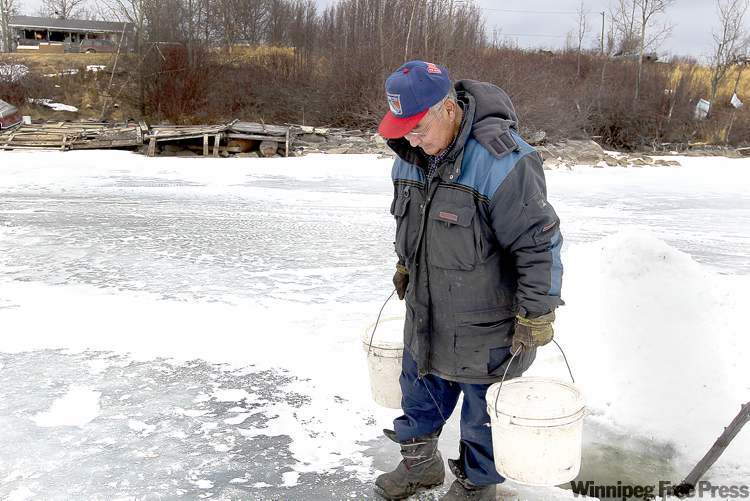A Manitoba solution?
Province has cost-sharing road map for bringing running water north
Advertisement
Read this article for free:
or
Already have an account? Log in here »
To continue reading, please subscribe:
Monthly Digital Subscription
$0 for the first 4 weeks*
- Enjoy unlimited reading on winnipegfreepress.com
- Read the E-Edition, our digital replica newspaper
- Access News Break, our award-winning app
- Play interactive puzzles
*No charge for 4 weeks then price increases to the regular rate of $19.00 plus GST every four weeks. Offer available to new and qualified returning subscribers only. Cancel any time.
Monthly Digital Subscription
$4.75/week*
- Enjoy unlimited reading on winnipegfreepress.com
- Read the E-Edition, our digital replica newspaper
- Access News Break, our award-winning app
- Play interactive puzzles
*Billed as $19 plus GST every four weeks. Cancel any time.
To continue reading, please subscribe:
Add Free Press access to your Brandon Sun subscription for only an additional
$1 for the first 4 weeks*
*Your next subscription payment will increase by $1.00 and you will be charged $16.99 plus GST for four weeks. After four weeks, your payment will increase to $23.99 plus GST every four weeks.
Read unlimited articles for free today:
or
Already have an account? Log in here »
Hey there, time traveller!
This article was published 17/12/2010 (5474 days ago), so information in it may no longer be current.
OTTAWA — The Manitoba government is willing to consider a partnership with Ottawa to get clean drinking water piped into homes on northern Manitoba reserves.
Chiefs heading communities where more than 1,400 homes have no running water are urging the provincial government to draft a similar agreement with Ottawa to one that got sewer and water infrastructure added to thousands of homes on northern Ontario reserves in the 1990s.
The Canada-Ontario Retrofit Agreement involved the two governments spending more than $200 million over 10 years to bring conditions in reserve homes up to standards closer to those enjoyed by other Canadians. That included better electrical wiring, running water and indoor fixtures such as bathtubs, sinks and toilets.

The Ontario agreement was unusual because funding for programs and capital projects on reserves is supposed to be a federal responsibility.
Provinces rarely step over that jurisdictional line.
The Ontario program was implemented in 1992 by former NDP premier Bob Rae. The Conservative government under Mike Harris renewed it for another five years and $126 million in 1997.
It’s unclear how much the first five years of the program cost, since most of the records are in storage.
By the time the program was over, nearly 3,800 homes on 35 Ontario reserves had been retrofitted. Ontario covered $60 million of the total cost.
Eric Robinson, Manitoba’s aboriginal affairs minister, said Thursday he isn’t familiar with the Ontario agreement, but he is willing to look at it or other options to partner with Ottawa to bring running water to houses on northern Manitoba reserves.
“If there are any partnerships, our government would certainly look at it,” Robinson said. “A Manitoban is a Manitoban. We’ve always said that.”
Robinson said the provincial government has partnered with Ottawa before to fund health facilities on reserves. In 2004, Garden Hill First Nation became the first reserve in Canada to have a kidney dialysis centre outside of a hospital.
It was built with a joint investment from Manitoba and Ottawa and was aimed at addressing the high rate of diabetes-related kidney disease in the Island Lake region.
Robinson also pointed to energy retrofit programs the provincial government and Manitoba Hydro have used to improve the energy efficiency of 100 houses in the Island Lake region.
Former NDP Ontario premier Bob Rae said when he visited communities in northern Ontario, where people were living in ramshackle homes, he decided he didn’t care about jurisdiction.
“It was a federal jurisdiction, but they weren’t doing anything,” said Rae, now an MP and the foreign affairs critic for the Liberal Party of Canada.
Rae said he travelled to a number of First Nations on the James Bay coast in the late 1980s and was “very much affected” by the conditions people were living in.
He said every province has to decide what is best, but he noted that not addressing living conditions on reserves can become a provincial problem because people who can’t live decently will move off reserves.
Provinces are responsible for funding health-care treatment off reserve, and people who live in communities with poor housing get sick more often, have more chronic diseases and end up costing the health system.
“The old jurisdictional battles just don’t make much sense,” Rae said.
He called the living conditions on reserves in Canada “one of the great dilemmas of our time.”
Manitoba Keewatinowi Okimakanak Grand Chief David Harper, who pleaded for help for his communities in Ottawa this week, wants commitments from the governments to get running water to every home on northern Manitoba reserves within two years. He estimated it can be done for about $66 million.
If Robinson invests some provincial cash in that project, he appears to have the backing of taxpayers.
In a Free Press/Probe poll in September, 63 per cent of Manitobans surveyed said given the health risks, the province should help the federal government fund drinking water upgrades in the Island Lake region, where half the homes have no running water.
mia.rabson@freepress.mb.ca

